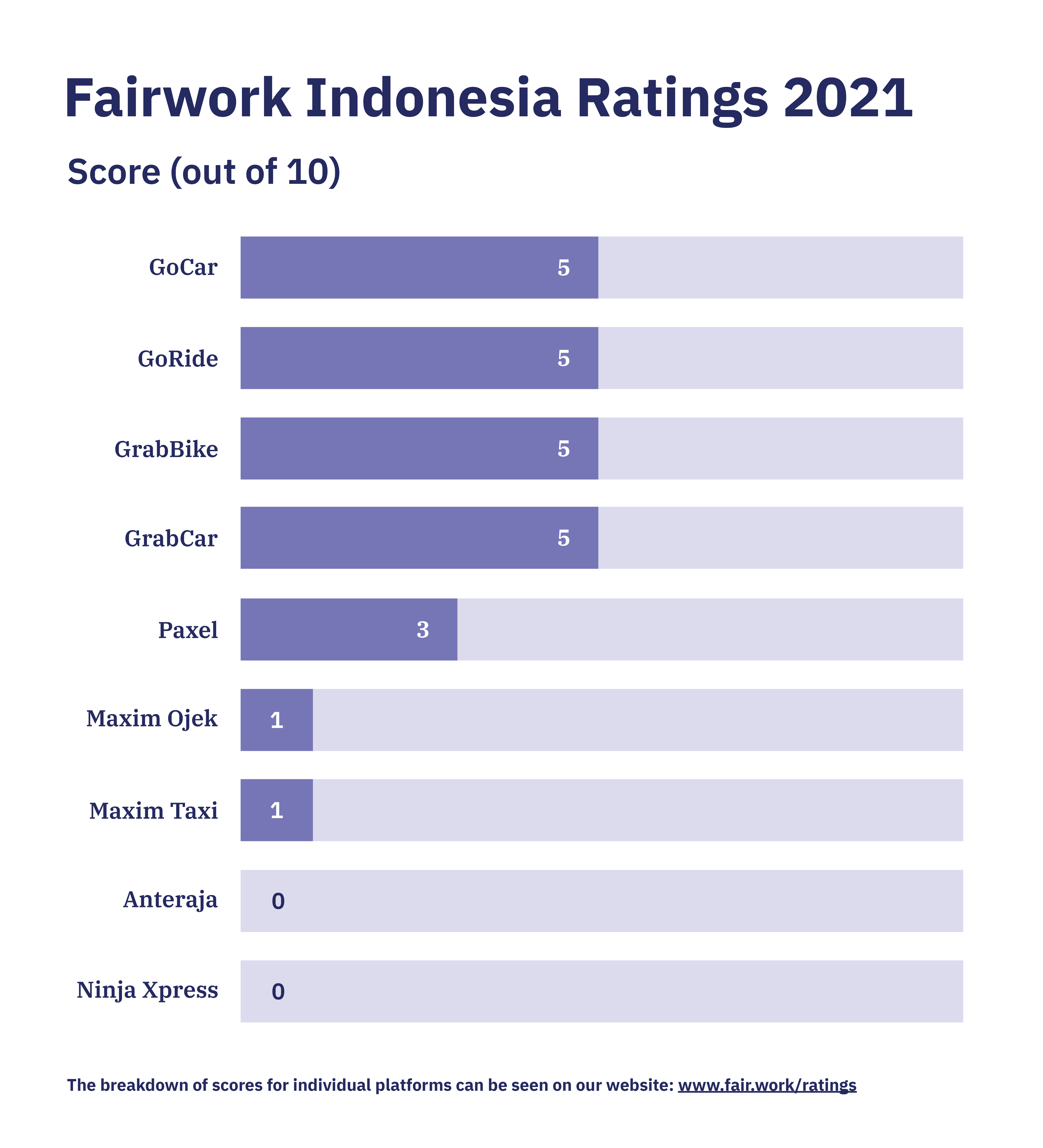Just out! First Fairwork Ratings for the Indonesian Platform Economy

This report presents the first set of Fairwork ratings for Indonesia. It evaluates six of the most prominent platforms in the country—Gojek, Grab, Maxim, Anteraja, Ninja Xpress, and Paxel—against five global principles of fair work: Fair Pay, Fair Conditions, Fair Contracts, Fair Management, and Fair Representation. The scores achieved by platforms range from 0 to 5, showing how there is still much room for improvement for all platforms.
The Indonesian gig economy has surged in recent years. Gojek alone is estimated to have contributed 104.6 trillion Rupiah (roughly US $7 billion) to the economy and is hailed, along with many other platforms, as part of the so-called ‘disruptive economy’ at the forefront of the “making Indonesia 4.0” agenda. Indeed, Indonesia witnessed early adoption of gig economy models: ride-hailing applications Uber and GrabTaxi both set up shop in 2014 with Gojak following a year later, offering the delivery of food and packages.
However, little has been done to investigate the conditions of the workers whose labour powers the growth of these companies. Gig workers in Indonesia generally have to work long hours to earn a livable income, and (as is common in the platform economy) are not protected by labour laws, since most are not classified as workers under Indonesia’s Manpower Law. The industry also lacks formally recognised unions, rendering workers unable to advocate for their own interests. The COVID-19 pandemic has further exacerbated a number of problems. Some workers have struggled, for example, to obtain enough orders to pay monthly leases on their vehicles.
The delivery and ride-hailing sectors are heavily male-dominated in Indonesia (only 15% of respondents in Fairwork’s research were women). While female respondents valued the flexibility offered by gig work, most of them told us they face many risks, from work-related accidents to sexual harassment. They also suffer discrimination, as seen with the examples of female workers who experience cancellations due to the reluctance of some male passengers to be driven by female drivers, and on average earn less than their male counterparts. Following protests by women workers, some platforms responded by offering additional protections to female workers. However, much more is needed to ensure equality and safety in the sector.
The application of the Fairwork principles to the conditions of Indonesian platform workers represents the first attempt to assess their working conditions. Fairwork is an international research project that evaluates working conditions on digital platforms. It is currently doing this in 25 countries across 5 continents.
This work was undertaken in Indonesia by the Center for Digital Society (CfDS) in the Faculty of Social and Political Sciences, Universitas Gadjah Mada, Yogyakarta, in collaboration with the Oxford Internet Institute at the University of Oxford, UK; the Centre for Digital Development at the University of Manchester, UK; the Centre for IT and National Development (CITANDA) at the University of Cape Town, South Africa; and other academic institutions from more than 25 countries in which Fairwork operates
Ratings
The Fairwork Indonesia 2021 ratings evaluate the working conditions in 6 digital labour platforms, divided in some cases into their separate operations (Gojek GoRide and Gojek GoCar, GrabBike and GrabCar, Paxel, Maxim Ojek and Maxim Taxi, Anteraja and Ninja Xpress,) against five global principles of fair work – fair pay, fair conditions, fair contracts, fair management, and fair representation. Each platform receives a fairness rating out of 10, with points awarded only if there is clear evidence that the principle is being met. Gojek GoRide and GoCa, and GrabBike and GrabCar lead the table with five points each. Paxel achieved three points, Maxim Ojek and Maxim Taxi one and Anteraja none.
Key Findings:
Fair Pay: despite the Indonesian government’s guidelines for per-kilometre fare payments to workers, no platform was able to evidence that they pay all workers a fair wage once workers’ logged-in hours and work-related costs are taken into consideration.
Fair Conditions: Grab, Gojek and Paxel protect workers from risk with accident insurance, emergency helplines, access to health insurance and other wellbeing initiatives. We were not able to evidence such initiatives from the other platforms, namely, Anteraja, Ninja Xpress, and Maxim.
Fair Contracts: most of the platforms have clear, accessible terms and conditions for workers. However, none of the platforms was able to evidence that these terms and conditions fairly shared risks and liabilities between workers and platforms.
Fair Management: Grab and Gojek have documented channels for communication with workers, and initiatives seeking to address key local discriminations and inequities. Unfortunately, none of the other platforms could evidence these things.
Fair Representation: Worker associations exist but are not formally recognised either in law or by platforms, and some workers are wary of joining collective protests or strikes due to fear of penalties from the platform. As a result, no platform was able to evidence fair representation of gig workers.
A more accessible version of the report is also available here.
The Fairwork Pledge
As part of Fairwork’s commitment to making platforms accountable for their labour practices, we are launching the FairworkPledge. The pledge aims to encourage other organisations to support best labour practices, guided by the five principles of fair work.
Organisations like universities, schools, businesses, and charities that make use of platform labour can make a difference by supporting the best labour practices, guided by our five principles of fair work. Organisations have the option to sign up to the Pledge as an official Fairwork Supporter or an official Fairwork Partner. Those signing up to be a Supporter must demonstrate their support for fairer platform work publicly and provide their staff with appropriate resources to make informed decisions in their supply chains. Becoming a Fairwork Partner entails making a public commitment to implement changes in their own internal practices, such as committing to using better-rated platforms when there is a choice.
